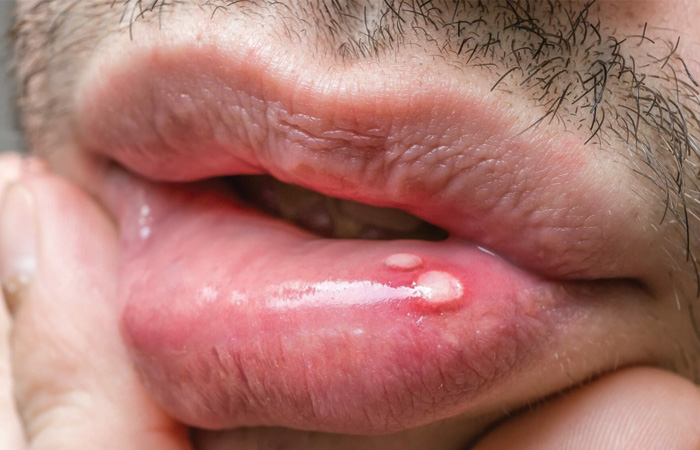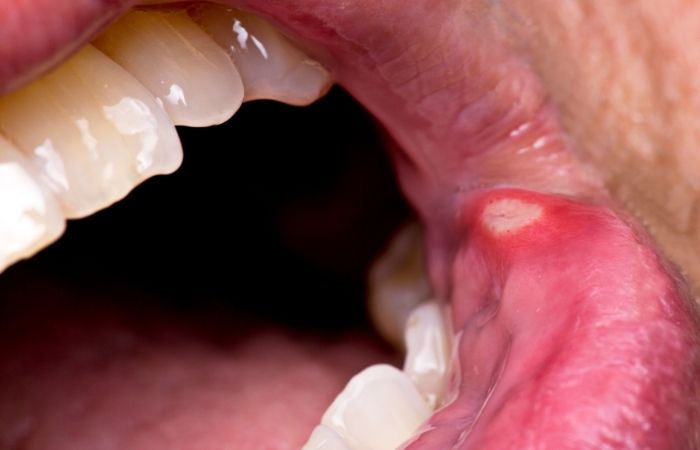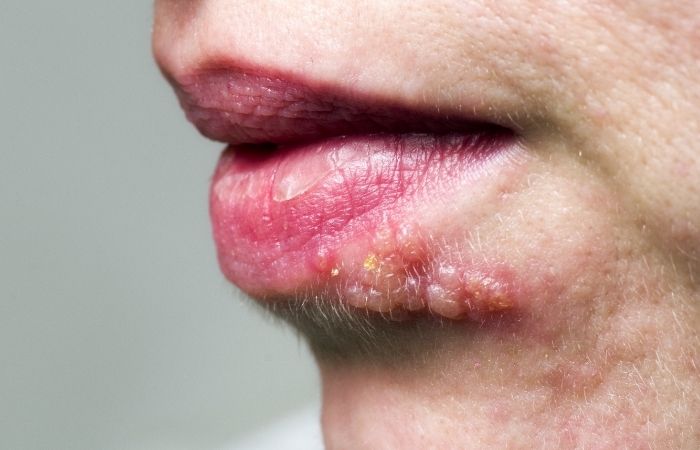Quick Answer: Yes, you can pass on oral herpes (HSV-1) even if you don’t have visible symptoms. The virus can shed asymptomatically from your lips or mouth, and infect others through kissing, oral sex, or close contact.
What I Didn’t Know About Oral Herpes
I thought cold sores were just cold sores, annoying, yes, but not an STD. I didn’t realize that what I’d had since I was a teen was actually HSV-1. No one had ever called it that. No doctor had ever explained it.
The truth is:
- Oral herpes affects over 3.7 billion people under age 50
- Most people get it through childhood kissing, not sex
- It can lie dormant for years, with or without visible outbreaks
What I didn’t know is that even without a cold sore, I could still pass the virus on. And I did.

People are also looking for... Can You Get Herpes From Kissing? Yep! Here’s What No One Tells You About HSV-1
How Asymptomatic Shedding Works
The herpes virus doesn’t need a blister or sore to spread. Asymptomatic viral shedding means the virus is active on your skin or in your saliva, even when you feel totally normal.
It can happen:
- Days before or after an outbreak
- During periods of stress or illness
- Randomly, even without any clear trigger
In fact, studies show people with HSV-1 shed the virus on about 9–18% of days, even without symptoms. So yes, kissing someone while “feeling fine” can still lead to transmission. That’s what happened to me.
The Moment I Found Out I Gave It to Someone
They texted me a week after we hooked up. It was calm but cutting:
“Just wanted to let you know I’ve got cold sores for the first time ever. Doctor says it’s HSV-1. Did you know you had it?”
I froze. My stomach dropped. I felt guilt I didn’t even know I was carrying. And then, shame, panic, denial. I typed and deleted my reply five times. I didn’t want to lie. But I didn’t want to say the truth either:
“I honestly didn’t know I had herpes. I thought it was just a cold sore.” That message haunted me for days.
Cold Sore ≠ Just a Cold Sore
Here’s the uncomfortable truth I wish I’d known earlier: A cold sore is herpes. Doctors sometimes soften the language. Parents don’t always explain it. And society? Society treats “herpes” like a punchline.
But the reality is:
- Cold sores = HSV-1 = oral herpes
- It’s spread by skin-to-skin contact, not just sex
- There’s no cure, but there are ways to reduce transmission
Knowing this doesn’t just protect you, it protects your partners, your future relationships, and your peace of mind.
How Oral Herpes Actually Spreads
You don’t need to be mid-outbreak to spread herpes. That’s one of the most important, and most misunderstood, facts about HSV-1.
Ways oral herpes spreads:
- Kissing (including pecks, not just makeouts)
- Sharing utensils, straws, lip balm, or cigarettes
- Oral sex (can transmit HSV-1 to the genitals)
- Even brief skin contact if viral shedding is active
The virus lives in nerve cells and resurfaces based on immune triggers, stress, illness, hormone changes. And during that time, even if you don’t have a visible sore, the virus may still be present in saliva or skin oils. That’s how I unknowingly passed it on.
Check Your STD Status in Minutes
Test at Home with RemediumOral Herpes Test Kit

 For Men & Women
For Men & Women Results in Minutes
Results in Minutes No Lab Needed
No Lab Needed Private & Discreet
Private & DiscreetOrder Now $33.99 $49.00
Why I Didn’t Know I Was Contagious
Like a lot of people, I’d grown up hearing phrases like:
- “It’s just a cold sore”
- “Everyone gets them, no big deal”
- “It’s not herpes, it’s just a fever blister”
This kind of language dilutes the seriousness. It makes you believe that unless you're writhing in pain or covered in sores, you're safe. And that’s dangerous.
In reality:
- Most oral herpes infections happen during asymptomatic periods
- You can carry the virus for years without knowing
- You can pass it on without meaning to
I wasn’t trying to hide anything, I genuinely didn’t know I had anything to disclose.
The Guilt After Giving Someone Herpes
It doesn’t matter how common HSV-1 is (and it is incredibly common). The moment you realize you’ve passed it to someone else, someone you care about, guilt takes over. I blamed myself. I spiraled. I felt dirty, even though I wasn’t. I was afraid to see them again. I thought they’d hate me. I hated myself.
What made it worse? The stigma. The silence. The fact that this happens to millions of people, and almost no one talks about it honestly.
How I Told Them the Truth
When I finally found the courage to respond, I didn’t over-explain or beg for forgiveness. I kept it simple and honest:
“I honestly didn’t know. I’ve had cold sores before, but no one ever told me it was herpes. I’m so sorry.”
Their reply wasn’t angry. They were hurt, yes. But more than anything, they were confused, just like I had been. We ended up having a real conversation about it. They appreciated the honesty. We both learned things. And while it didn’t erase the transmission, it helped build trust.
What I Wish I Knew Before It Happened
If I could go back, I’d do a few things differently:
- Ask my doctor if my “cold sores” were HSV-1
- Get tested, even without symptoms
- Be upfront about past cold sores with new partners
- Use dental dams or condoms during oral sex, even if I felt “fine”
- Understand that “no symptoms” doesn’t mean “no risk”
But most of all, I’d stop treating herpes like a moral failing. It’s a virus, not a punishment.
How to Prevent Spreading Oral Herpes (Even Without Symptoms)
Once you know you carry HSV-1, the responsibility shifts, but it doesn’t mean you have to stop kissing, dating, or being intimate.
Here’s how to reduce the risk of spreading oral herpes:
- Don’t kiss during an outbreak (or if you feel one coming on)
- Wash hands after touching your face or lips
- Don’t share razors, lip balm, or anything that touches the mouth
- Use barriers (like condoms or dental dams) during oral sex
- Talk to your doctor about daily antivirals (like valacyclovir)
These steps won’t eliminate risk, but they dramatically reduce it, especially when you combine honesty with science.

People are also looking for... Why Herpes Testing Isn’t Routine, and What to Do About It
Talking to a Partner After You've Transmitted Herpes
It’s one of the hardest conversations you’ll ever have. But it’s also one of the most important. If you’ve accidentally passed oral herpes to someone:
- Don’t lie. People can feel betrayal more than infection.
- Take ownership. You don’t have to grovel, just be real.
- Use facts, not fear. Let them know what it is, and what it isn’t.
- Offer resources. Share info about suppression meds, coping, and support groups.
Most of all, listen. Some people need to process. Some will react with emotion. But you don’t need to carry their reaction as punishment, just as perspective.
Managing the Emotional Fallout
Getting herpes is one thing. Giving it to someone? That hits differently. The emotional aftermath can include:
- Guilt or shame
- Fear of rejection
- Anxiety about future relationships
- Feeling “dirty” or damaged
But here’s the truth: you are not bad, dangerous, or broken. You’re human. You didn’t invent this virus. And the fact that it lives in half the population means you’re far from alone.
Support helps. Talk to a therapist. Join online herpes-positive forums. Read real stories. Normalize it for yourself, so you can normalize it with others.
Oral Herpes Isn’t Just “Mild”; It’s Misunderstood
We downplay oral herpes because it's so common. But common doesn't mean casual.
HSV-1 can cause:
- Painful sores, especially during the first outbreak
- Flu-like symptoms in some people
- Ongoing stigma and mental health stress
We need to stop pretending it’s nothing just because it doesn’t always look serious. Cold sores are herpes. And herpes deserves both medical accuracy and emotional honesty.
FAQs
1. Can you spread oral herpes without a sore?
Yes. This is called asymptomatic shedding, and it’s how many people transmit HSV-1 without knowing it.
2. What should I do if I gave someone herpes?
Be honest. Apologize. Share medical facts and support resources. And know that you’re not alone.
3. Is a cold sore the same as herpes?
Yes. Cold sores are caused by herpes simplex virus type 1 (HSV-1), which is a form of oral herpes.
4. How do I tell someone I might have exposed them?
Be calm, clear, and compassionate. Offer facts and space. Let them respond on their terms.
5. Can I still kiss or have sex if I have HSV-1?
Yes, with precautions. Avoid contact during outbreaks and consider barrier protection or suppressive meds.
6. Should I get tested even if I’ve never had symptoms?
It depends. Most doctors don’t recommend routine herpes blood tests unless there’s a reason to suspect exposure.
7. Can oral herpes be passed to the genitals?
Yes. HSV-1 can cause genital herpes if transmitted through oral sex.
8. Will everyone I kiss get infected?
No. Transmission depends on viral shedding, immunity, and contact. Not all partners will contract it.
9. Is oral herpes dangerous?
Not usually, but it can cause discomfort and psychological stress. In rare cases, it can lead to complications in newborns or immunocompromised people.
10. Is there a cure for oral herpes?
No. But antiviral medications can reduce symptoms and transmission risks.
The More We Talk. The More We Protect Ourselves.
I didn’t set out to hurt anyone. I didn’t even know I had something that could be passed on. But oral herpes doesn’t wait for your permission, it moves in silence.
If you’ve given someone herpes, whether you knew it or not, know this: You are still worthy of love, forgiveness, and respect. The more we talk about it, the real stuff, the raw stuff, the more we take away the shame. So start now. Get informed.
Be honest. And don’t wait for a crisis to understand what your body might be carrying.
Sources
1. About Genital Herpes – CDC overview of HSV‑1 oral to genital transmission and asymptomatic spread
3. Living With Herpes – Planned Parenthood, facts on prevalence, stigma, and transmission
4. HSV‑2 and Oral Sex: Transmission, Types, and Symptoms – Medical News Today
5. Oral Herpes – Johns Hopkins Medicine, causes and prevention of HSV‑1 spread










